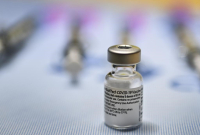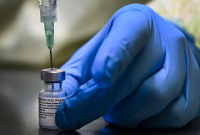Support strong Canadian climate journalism for 2025
The immunization program at a remote First Nations community on Cortes Island, B.C., is continuing to roll out despite the current shortages of COVID-19 vaccines.
High-risk populations, such as rural remote Indigenous communities — particularly those that experienced COVID-19 clusters — were among the first slated for vaccinations in February under Stage 1 of the provincial plan.
And the First Nations Health Authority is saying it's still hopeful to meet the next step of immunizing everyone who wishes to get a shot in all First Nations communities by the end of March.
Klahoose Nation Chief Kevin Peacey said he was relieved when the small community’s promised second doses arrived, if a week later than originally planned.
Cortes, a small island off the northeast coast of Vancouver Island, has limited medical facilities, and getting to the nearest hospital involves a two-ferry journey that often can’t be made in wild winter weather.
“There was some worry (the vaccines) wouldn't make it on time,” Peacey said Wednesday.
The vaccination program out of the Klahoose Health Centre is underway and going well despite the hiccup, Peacey said.

“We hear a lot of our members are jumping at the bit to get in line first,” he said.
“It is frustrating with the delay, but I keep positive that it will all work out in the end.”
Delays in the delivery of the Moderna and Pfizer vaccines across Canada are threatening B.C.’s wider immunization schedule.
However, First Nations communities should still be getting a first dose of the vaccine by the end of March as planned, the First Nations Health Authority said Tuesday.
Approximately 16,000 people in 90 First Nations communities have received a first dose of the Moderna vaccine and more doses are en route to another dozen communities, the FNHA said, adding the new shipments may include either first or second doses.
A total of 4,000 of those vaccinations took place in the Island Health region, the FNHA said.
The FNHA is taking a whole community approach to vaccination —– working to inoculate all adults who wish it, said acting chief medical officer Dr. Shannon McDonald.
A total of 42,000 vaccines are needed to provide a first dose to everyone over the age of 18 in the 203 First Nations communities in B.C., FNHA added.
“Our biggest challenge has been the amount of vaccine,” said McDonald, adding the province is working with the FNHA to provide as many doses as possible.
“It is our intention, working with our provincial partners, that all of the First Nations communities have the opportunity to receive that vaccine, if they choose to, by the end of March,” she said.
“The urban population will likely take longer depending on accessibility,” McDonald added.
McDonald said there are 426 First Nations people with active cases of the virus, 185 of them living on or near reserves, according to FNHA data as of Friday.
There have also been 68 First Nations deaths from COVID-19, with 38 of those in reserve communities.
Although concern is running high over the possible spread of COVID-19 variants, none have shown up yet in First Nations communities or urban populations in B.C., McDonald said.
Many First Nations leaders are expressing the desire to provide their members with the vaccination regardless if they live in their home community, said McDonald.
But given the vaccine shortages, that option isn’t possible at the moment, she said.
“Unfortunately, in the context of vaccine shortage, there have been extreme limitations as to how and where we can provide vaccine,” McDonald said.
Additionally, members living in urban areas shouldn’t be making the trip home because they could transmit the virus in remote communities likely to have less access to acute care, said Richard Jock, the health authority’s CEO.
“So, this is really trying to mitigate the risk to people who might be exposed COVID-19 and the consequences of that,” he said.
Although members of the Klahoose community are getting their second dose of the vaccine, residents are still taking care to follow all the provincial pandemic protocols, said Peacey.
Klahoose went into lockdown and declared a state of local emergency at the end of November to successfully stamp out a COVID-19 cluster after four people in the community tested positive for the virus.
The community got the all-clear from health authorities at the end of December and began its first round of vaccinations the first week of January.
“We’re excited to have that second dose,” Peacey said, adding it came with a bonus.
“We’ve received our card to say we’ve been vaccinated.”
Rochelle Baker / Local Journalism Initiative / Canada’s National Observer







Comments